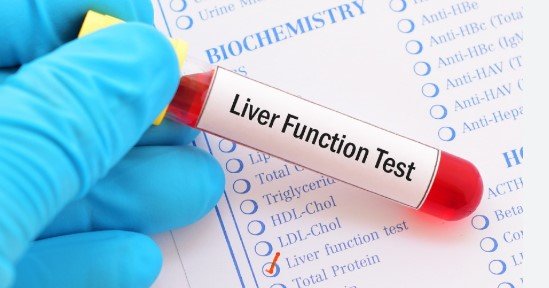What Is a Liver Function Test? Everything You Need to Know

Indeed, as far as modern medicine is concerned, none of the tests that comprise the liver function test (LFT) are as indispensable as one for harmoniously establishing the health of the organ—the liver. The liver is an important organ in the maintenance of holistic health through performing functions such as detoxifying, processing nutrients, digesting food via bile, and balancing hormones.
Internal and external lifestyle choices, infections, and other health conditions can affect the liver. This is where the idea of the liver function test takes off, from the liver state interpretation to what early health problems it can indicate.
If you are experiencing any symptoms like fatigue, jaundice, or even abdominal pain or want to see how it is going with your health, the LFT is a great way to gauge your liver performance. This blog delves deep into what a liver function test entails, why it is important, and everything you need to know to make informed pieces of health-related knowledge.
What Is a Liver Function Test?
A liver function test (LFT) is a battery of blood tests that evaluates the liver’s health by measuring different enzymes, proteins, and other components it produces. It indicates inflammatory changes, damages, or functions in the liver, for example, as a result of chronic diseases like hepatitis or fatty liver, alcohol abuse, medications, or infections.
The primary markers tested during an LFT include:
- Alanine transaminase (ALT): Indicating liver cell damage.
- Aspartate transaminase (AST): Helps access liver and heart health.
- Alkaline phosphatase (ALP): Measures bile duct and bone disorders.
- Total bilirubin: Determining liver waste clearing efficiency.
- Albumin and total protein: Tests the liver’s capacity to produce proteins.
A doctor could recommend an LFT as part of a health check or when a patient’s symptoms suggest a potential liver dysfunction. It’s also used in most cases to monitor liver disease progression, evaluate treatment effectiveness, and assess possible side effects from certain medications.
10 Things You Need to Know About Liver Function Test
Understanding a Liver Function Test (LFT) is vital in the interpretation of its results, troubleshooting possible problems, and determining when it is necessary to have one done. Below, we elaborate on the most critical aspects that will enable you to acquire a comprehensive insight into this invaluable tool for diagnosis:
- Purpose of the Test
It is primarily a liver function test that identifies liver diseases like hepatitis, steatosis, fatty liver disease, cirrhosis, and infectious conditions of the liver. It shows the progression of chronic liver diseases and helps evaluate the treatment’s effect on patients. Finally, it addresses liver injury due to alcohol consumption, certain drugs, or toxins.
- What It Measures
LFTs measure a range of indicators, including:
- Enzymes: When liver cells are damaged, alanine transaminase (ALT) and aspartate transaminase (AST) are elevated.
- Bilirubin: It is a product of red blood cell breakdown; its high levels indicate impaired liver function or possible obstruction of bile flow.
- Albumin: A product of the liver, low levels can indicate some forms of liver disease.
- Alkaline phosphatase (ALP): High levels may indicate bile duct obstruction or bone disease.
These measures provide a complete assessment of liver function, as well as liver health.
- Symptoms That Require an LFT
Certain symptoms strongly suggest the need for a liver function test. These include:
- Jaundice (yellowing of the skin and eyes)
- Chronic fatigue or weakness
- Dark urine and pale stool
- Swelling in the abdomen or legs
- Persistent nausea or vomiting
- Unexplained weight loss or appetite changes
Even subtle symptoms should not be ignored, as they may indicate an underlying liver condition.
- Fasting May Be Necessary
Certain liver function tests require fasting for eight to twelve hours to attain accurate results. After fasting, it is proper and good not to eat food and drinks other than water or take some medicines, as this affects the test results, mainly for glucose, cholesterol, and liver enzyme levels. Therefore, always comply with the order from your healthcare provider about fasting.
- Relation to Other Tests
To put it bluntly, LFT data may be combined with results from other diagnostic tests for a more holistic assessment of health status. For example, a Prolactin Test is another test suggested when there is a suspicion of hormonal imbalance; unlike the latter, however, imaging tests like ultrasound or CT scans may be done together with LFTs to visualize the liver structure, thus detecting abnormalities.
- Early Detection Saves Lives
Usually, liver diseases do not show symptoms early on; hence, regular tests are important for early detection. Early management of conditions, such as fatty liver diseases, hepatitis, or liver fibrosis, is possible. Regular LFTs become very important for people who have a family history of liver disease, heavy drinkers, or those who take hepatotoxic medications.
- At-Home Testing Options
Modern healthcare advances enable at-home liver function tests. Such services offer accuracy equivalent to traditional lab tests and can offer privacy and flexibility. A healthcare professional collects at-home samples, and results are shared online or via a consultation, saving you time and effort.
- How Long It Takes
The blood-drawing process for a liver function test takes 5-10 minutes. Most laboratories can acquire results in just 24 hours. This rapid turnaround makes LFTs an effective means of detecting acute medical problems for many patients.
- Factors That Can Affect Results
Numerous factors can influence LFT results, including:
- Medications: Some medications, such as acetaminophen or even antibiotics, can be responsible for increasing liver enzymes.
- Alcohol consumption: Drinking alcohol before the test may distort the results.
- Illness or infections: New diseases or infections may affect liver function transiently.
- Physical activity: Strenuous exercise raises the values of certain enzymes before the tests.
Tell your doctor about your lifestyle, medications, and recent activities so that the results can be correctly interpreted.
- Follow-Up Actions
Abnormal results in a liver function test may require further investigations, such as:
When abnormal liver function test results are recorded, some further investigations probably need to be performed, such as:
- Examination imaging tests like ultrasound images, MRI scans, or CT scans to visualize the damaged or tumorous hepatocytes.
- A liver biopsy extracts small tissue for a more detailed examination as required.
- Lifestyle changes or diet changes to reduce pressure on the organ.
- Medications or treatments for specific illnesses, such as hepatitis and bile duct problems.
Your healthcare provider will then direct you to the next correct level of care based on the test results.
Read also: Tax Benefits of Health Insurance with OPD Cover
The Final Words
The Liver Function Test (LFT) is primarily preventive and diagnostic, really more than just giving you numbers or words in scores or discourses, but rather an indication of liver health and performance. That test is not unique for you who have symptoms, a person in treatment without ambiguity about liver disease, or someone whose family history suggests possible liver disease. It even clarifies your liver’s status to those with no associated symptoms because living healthy, doing regular liver function tests, and healthy lifestyle behaviors are the best prevention for good liver health.







